#fantasy thoughts lol
Text
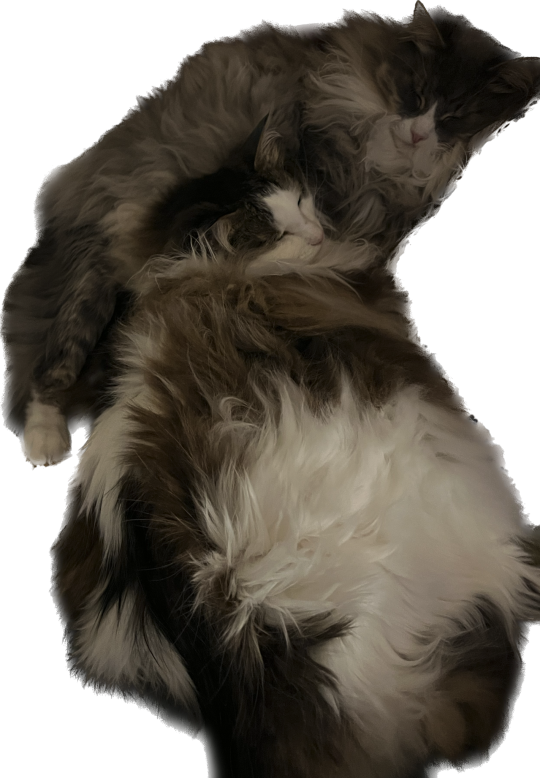
Transparent gentlemen 💖
#transparent#babies#Obi and ani#cats#cats of tumblr#ani#obi#meow#transparent images#mostlycatsmostly#cats of the world#mine#personal#gremlins#Norwegian forest cats#floating images#happiness#just want to be with them all day and never go back to work#fantasy thoughts lol#a rare cryptid sighting#tumblr cats
345 notes
·
View notes
Text
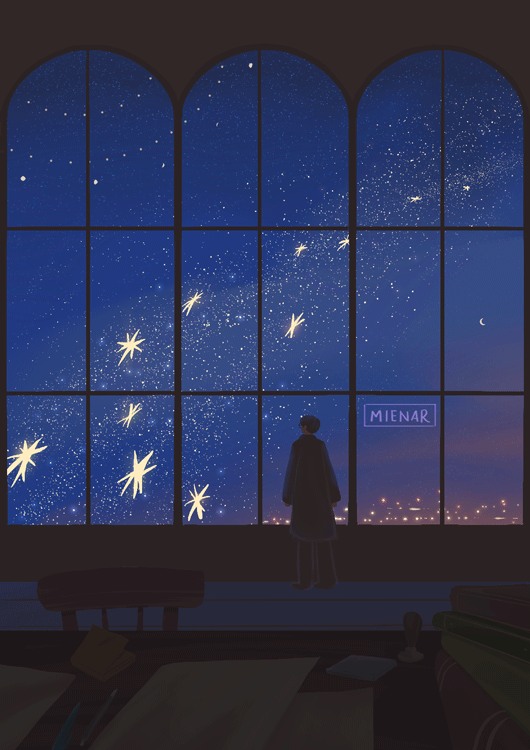
from us it begins
instagram | shop | commission info
#artists on tumblr#illustration#animated illustration#animation#backgrounds#background illustration#animated gifs#stars#celestial#cozy rooms#myillust#hellooo! :') it's been a while! i really hope that you've been well healthy and safe#had a lot going on for me for the past couple of months but things are settling down thankfully and i can dedicate time to making art again#this is more of a whimsical/fantasy-like artwork - the thought or idea of seeing glowing stars up close#i know very well that stars dont work like that lol but i've always liked the idea that stars can be small and fit at the palm of our hands#a whimsical dream for sure!#anyways! i hope you'll like this! and i hope you'll have a lovely day or night ahead! <3
2K notes
·
View notes
Text
My sub is used to going in my lap now. Just today, he walked over to me shyly while I was sitting on the couch.
“Are you okay? Did you want to tell me something?” By now I can tell when he has to wet himself by the smallest signs—the way he clasps his hands and blinks a little faster than usual.
I open my arms to show that he can sit down if he wants. He sits down gingerly as if it hurts a little. “I have to go,” he says quietly in my ear.
“Aw, and you want to be comfortable while you do?” I ask him, brushing his hair with my fingers. “Do you still have a diaper on?”
He squirms a little at the embarrassment of being asked about what he’s wearing under his jeans.
“Yeah…” he says, finally.
“Tell me when you start going,” I say.
“I already was,” he says in a small voice. “Like for the past minute.”
“Hey,” I say, giving him a light slap on the behind. “Tell me right away next time.”
But I still hold him until he’s totally relaxed in my arms and I can tell he’s finished. “Okay,” I say after a few minutes pass, “I can tell you’re done now. Are you gonna get up.”
“Not done,” he mutters.
“What was that, honey?”
“I’m not done. I…I…I…”
“What, what, what?”
“I…I have to go number two also.” I feel his hot cheek press against mine as he leans his face into the crook of my shoulder.
“Do you want to go to the toilet…or…” I find his hand and gently rub the back of it with my thumb. “You wanted to do it here where you’re comfortable, huh? Is that it?”
“Mmm,” he says, clearly embarrassed. “Maybe…”
“I got you those nice big diapers this time, remember? So it will hold all of it.”
“Mmm…I…um,” he stammers.
“I’m not going to tell anyone if you go in your pants a little, baby.” He burrows his head deeper into the space between my neck and shoulder. I stroke his back. “I bet you feel really relaxed since you went pee. Is it making it hard to hold it?”
“A little bit,” he whispers.
“Go ahead, it’s okay. I won’t tell anyone you poop yourself sometimes. It can be our secret.”
He slowly raises his head and readjusts himself on my lap so that he’s kneeling and straddling my legs. I keep stroking down his back. I hear him grunt a little. I can feel his diaper growing. “Oh, good boy, let it all out.” He sighs and rests his head on my chest. I keep stroking his hair as he finishes. “I’m so glad you’re so comfortable around me.” I keep saying “good”, and “nice”, so that he knows I don’t mind at all.
“I’m…I think I’m done…” he says, his body relaxing into me.
“If you’re not sure, let’s keep the diaper on for a little while longer, okay? Just to be safe. Okay, we’ll lie down here for a second and I’ll spoon you.”
We lie down together on the couch and I rub his stomach and chest, secretly turned on by his mess pressing against my groin.
#omutsu#messing#omutsu oc#fantasy like this is fictional lol I just thought it would be fun to write it this way
679 notes
·
View notes
Text
I think one of the (several) reason for why Shadowbringers is so good is because the narrative is more about the individual characters than it is the Greater Conflict.
Like, the Greater Conflict is definitely there, obviously, it's what keeps the story going, but the focus is always on the people, much more so than the other expacs. HW and STB also have some level of character focus ofc, but it's very selective and even then the focus is based on them in the specific context of the current conflict.
But in SHB, the story bends around the characters' narratives, rather than the other way around. The story forms to put them in situations that challenges their flaws and limitations, by forcing them to confront it and actually deal with it. Even just at the very beginning, you see the twins being dealt a terrible hand that very neatly clashes against their faults.
Alisaie is confronted with a situation that she can and could never do anything about. She has no means to help the patients (at the time at least). The only way for her to help them is by eradicating the source of the affliction itself: the Light. But the Light isn't just some Big Bad she can kill and be done with. Even when all the lightwardens are down the Light is still there, it's just more manageable. Alisaie learns to not only see the bigger picture, but to care for it for her own reasons. For all that she has participated in Big Operations, it has always been because that's what others were doing, what others cared for to be done. She feels for the people of Doma and Ala Mhigo, but she didn't set out to liberate their homelands because she has any personal investment in it. But other people do, and she cares about what other people- be they strangers or friends- care about.
Caring about other peoples feelings and opinions isn't a flaw by itself of course, but doing things without any sense of personal purpose, is. This is what SHB helps her fix and confront, because it is personal now, she does it because she cares.
Alphinaud is forced into a situation where diplomacy and negotiations does and would never work. He can't talk himself into Eulemore, and he sure as hell can't convince Vauthry or the free citizens to let go of their life of ignorant luxury. The problem here also isn't as straightforward as a corrupt ruler, because even after Vauthry is revealed for the bastard he is, it takes considerable effort and convincing to get them to get off their asses and get to work. It's one thing to change the minds of people who wanted the same outcome just in a different way (like Ishgard- they rejected unity with the dragons, but they still wanted an end to the war), but it's another thing entirely to convince people that another way of life is even worth it.
And this is what SHB teaches Alphinaud, that words and deeds can achieve much, but that there is much more to diplomacy than appealing to their wants and/or sensibilities to convince them of an alternative outcome. His development may not be as immediately noticable as some of the others (largely bc he had a lot of it already from HW), but it is still very much there.
Urianger's development had already been build up and sort-of started already, but we don't really get to see it until it near explodes in his face after we kill Vauthry. Even after he swore off secrecy, he's forced to confront his morals when the Exarch bids his assistance. Urianger has always been looking at the greater picture, to the point he'd almost lose himself in it if it wasn't for the overwhelming guilt he feels. He works with the Exarch, because he knows he's the only one capable of it, and he hates the very fact that he is. When the climax of the plan is about to be executed, he is pained to the point that even he can't mask it anymore. He has betrayed their trust once more and once more it will result in the death of a friend.
But it doesn't, and that's what's needed for him to confront himself. As terrible and unexpected as the circumstances around it was, it did show him that there are other ways. There is no one way to solve a problem, the first choice doesn't need to be the only one. And he would find those other ones of he had just talked to the others.
The pay-off doesn't quite come until EW, where we see him actively make the choice to go against his first instinct of acquiesing to the Loporrits' plans, and instead chooses to consult us, but that scene wouldn't have made sense or even happened had it not been for his development in SHB.
Now, Y'shtola is a bit of an odd one because while she does get her due focus, she doesn't quite get the same amount of development as the others. Rather, it shows how she thrives when not held back by others interests and (often somewhat needless) bounderies. Her intelligence and charisma have the chance to shine, her independence and confidence now rewarded rather than punished. In ARR, she is constantly annoyed by the Maelstroms way of dealing with things, and how no one bothers to actually listen to her. Her advice and reprimands are almost entirely ignored until the problem blows up in their faces and they have no choice but to concede that she was right.
Being independent and confident aren't flaws by themselves, but her sometimes aggressive approaches to telling others off does her few favors. In SHB, she has the Night's Blessed who actually heed her word and respect her, they listen to her and actually take what she says- be it advise or reprimand- to heart.
She does also, however, have to deal with Thancred who, much like the Maelstrom, ignores her reprimands and doesn't listen to her. The difference here is that her bluntness actually serves a purpose. In ARR, her bluntness lacks tact and meaning, simply a result of frustration. The Maelstrom won't listen to someone who doesn't come up with fleshed-out arguments and solutions, but Y'shtola doesn't bother giving them any until she knows they'll listen. But with Thancred, she does give him the solution. It's just that the solution is him. His words, to be precise, and his acceptance. And he needs to be reminded of that, and she does. It doesn't automatically solve anything, but that's simply how it is with complicated situations like that.
Speaking of Thancred, his narrative is probably the most important of all for SHB. He's always been shown as a capable, but ultimately self-destructive man who genuinely does not know how to deal with himself in a healthy manner. Theoretically speaking he knows, he recognizes that he is self-destructive, but he still has no idea how to actually fix it. It's been shown as early as ARR when it results in him getting possessed, but it's not really made a point of until it almost ruins his relationship with Ryne. Up until now he could just ignore his problems, but with Ryne he can't because now The Problem(s) aren't just his anymore. Anything that would hurt him now would also hurt her, meaning that if he wants to continue doing the one thing he actually cares about (protecting his loved ones) then he needs to get his shit together.
But Thancred doesn't know how to. And for all that his friends try and try to help him, he doesn't know how to. He's paralyzed. Thancred is so deep into his self-destructive habits that it takes the threat of both his and the person(s) he loves the most in the worlds deaths to get him into action. He doesn't know if it's Minfilia or Ryne who will return, and I'm not sure he expected to survive Ran'jit. He only has this chance, and if he wants to die without (as many) regrets he has to do something now.
And he does. He does and what it is he does is tell Ryne that whatever happens, it has to be her own choice. That he will accept any outcome, that he will still care about her no matter what, that as long as she lives or dies as she wants to, that he still loves her. He still loves her. And it works, because that's what he's needed to do all this time, to be able to just tell her that she matters. That he cares.
He tells her to live her own life, and he learns to live his own too.
#had to put a cut bc this got WAY long lol#replaying shb as you do. goes insane. as always. it has me in a chokehold#the story primarily focuses on thancred & ryne but EVERYONE gets character development. yes even y'shtola. its just not as apparent w her#OOUUGH *explodes*#i have many more thoughts still but if i start rambling in the tags ill never stop so i will spare you. this time#alisaie leveilleur#alphinaud leveilleur#urianger augurelt#y'shtola rhul#thancred waters#ryne waters#shadowbringers#final fantasy#final fantasy 14#final fantasy xiv#ff14#ffxiv#xander rambles#xander being insane about ryne#SHES INCLUDED SO IT COUNTS
402 notes
·
View notes
Text
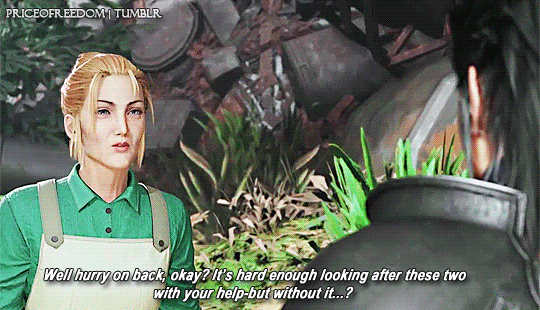
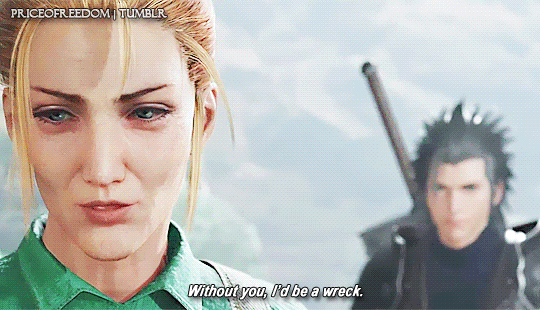
#Elmyra approving of Zack makes me so happy 😭
FF7 Rebirth
20 / ?
#final fantasy vii#ffgraphics#elmyra gainsborough#zack fair#gamingedit#ff7 remake#ff7 rebirth#ff7#elmyra#ff7 rebirth spoilers#rebirth spoilers#creaciones#i always thought she'd come to love him if only they had the chance to meet#glad to see it's exactly what happened :')#if zerith reunited she'd be so happy for them 🥺#knowing aerith would have the best boyfriend ever by her side#someone who would always take care of her no matter what#someone who would do the impossible just to make her happy#and he's good with kids too. like 🥰#zack already calls aerith's home HIS home i'm gonna go crazy#sorry for the fangirling but akhssjd if part 3 doesn't have them reunite and live together i'm gonna riot#the three of them deserve happiness!!!#and also i want zack to contact his parents so bad :( they deserve to see their son again#i'm making myself sad. i'm gonna stop now lol
300 notes
·
View notes
Text
Toph Beifong doesn’t hold up as disability representation - Disability in the Media
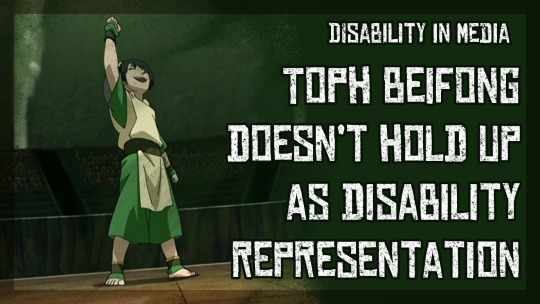
[ID: A screenshot of Toph, a twelve-year-old girl with black hair in a loose, green and tan short-sleeve shirt and shorts, cheering in an arena. Next to text written in a rough, blocky font: "Disability in Media - Toph Beifong Doesn't hold up as disability representation" /End ID]
Avatar the Last Airbender is one of my all-time favourite TV-shows, and Toph is still easily one of my favourite members of Team Avatar. I was a few years younger than Toph when the show first started airing, and being a disabled kid who was into martial arts, constantly being dismissed by my able-bodied opponents and teachers, meant that I connected very strongly with her right from the get-go.
But upon my last couple of rewatches of the series, I began to come to the realisation that my opinions on Toph as a shining example of good disability representation were... well, pretty heavily influenced by my nostalgia for the show and that many aspects of Toph's character just don't hold up today. Which, honestly is fair, the show is nearly 19 years old (if it were a person in my country, it would be old enough to drink) and I think it's pretty ridiculous to expect every part of every character from an 19 year old show to age well. So today I wanted to talk about the things I think Avatar the original Last Airbender did right with Toph, where I think they missed the mark, and what changes I think would need to be made to Toph to make her work for a modern audience.
So let's start with why I think Toph doesn't really hold up as "good disability representation" today, and the elements of her character that just haven't aged as well.
For me, one of the biggest issues I noticed upon rewatching the show, is how often we are told (often by Toph herself) that she is blind, but how infrequently we are actually shown it's impact on her life beyond her bending or outside of jokey contexts. Outside of her bending, we only ever see her blindness impacting her ability to do things like read or write, otherwise, she functionally has full vision -so far as the audience is informed - with the only exceptions being when she's in the air or water (e.g. on Appa or in the submarines) or in loose soil (e.g. the desert). Having places and circumstances where she doesn't have access to her power that allows her to "see" was a step in the right direction, but I do think it would have been better if her seismic sense wasn't quite as accurate, even in the most ideal of circumstances.
But why? Well, I think Suki explains it really well, long before Toph is even introduced. when Sokka says "I should have seen you as a warrior instead of a girl" Suki stops him and says "I am a warrior, but I'm also a girl". Being a warrior and a woman are both important parts of Suki's character, and only recognising her as one or the other means ignoring a big part of who she is, and the same is true for Toph. Being blind is a big part of toph's character that has informed a lot of her life, but so is being a warrior and bending master. Many people see Toph as a warrior or fighter, but ignore her disability, but both are important. She's disabled, and a warrior, and those things don't cancel each other out, the same way being a warrior doesn't diminish Suki's status as a woman.
When the show was still airing though (and even still today) it was very common to see non-disabled fans of the show exclaiming that they honestly forget that Toph is even blind sometimes, with many people going so far as to say that she's not even disabled (and that this was a good thing). While I do think some of that comes from the fact they weren't used to seeing a disabled character as both disabled and an active participant in these kinds of stories, I do think this mostly happened because of the show's lack of, well, showing the impact of her blindness on her daily life and allowing her earthbending and seismic sense to erase the effects of her disability to some extent. It's much harder to forget a character is blind when it impacts their daily life in ways that are shown to the audience. This doesn't have to be in big, showy ways mind you, showing things subtly but consistently works way better than one "very special episode" type setup.
In the show as it is though, the seismic sense functionally gives Toph a perfect image of her surroundings until it's just not available anymore for *plot reasons*.
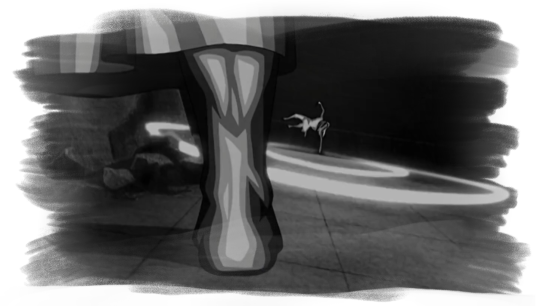
[ID: A black and white shot of Toph and how she sees the oponent she's fighting, with shockwaves radiating from him towards her to indicate how she's interpreting the scene. Her foe has jumped into the air and now has his hand dug into the ground of an arena, about to launch rocks towards her. /End ID]
In many ways, her picture of the world is better and clearer than what the non-disabled characters can see, leading to this feeling of her disability being erased. It may have been better though if the seismic sense could give her a general idea of big things in her immediate vicinity but she still missed the finer details, functioning at least a little bit more like a tactile/earthy-vibration version of the limited sight some legally-blind people have in real life. Things like a person's position, movement and overall pose would still be "visible" to her in a general sense, as well as big things in the environment (including things underground, since there are a few plot-points that require that), but smaller things like details about objects and creatures, people's facial expressions or what they're doing with parts of their body that have no direct contact with the ground (like their hands) is less clear.
On top of this, she may struggle to detect smaller, lighter objects or creatures that realistically wouldn't cause much of a vibration at all. creatures as small and as light as Momo and Hawky for example might be detectable, but "fuzzy" to her, and anything smaller might make enough of a vibration to tell her it's there when it moves, but not enough for her to be able to tell what specifically it is without some other cue (such as sound). There are a few moments in the show that seem to imply this is what they were initially going for, but it's not really consistent, and is directly contradicted in her debut episode, "the blind bandit" when she explains that she can even "see" something as small as the ants off in the distance.
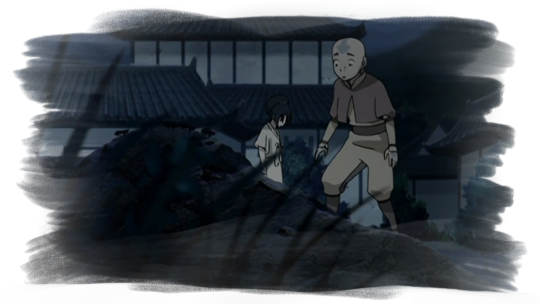
[ID: A shot of Aang, a twelve-year-old bald boy with an arrow tattoo on his head, dressed in a yellow and orange outfit, standing with Toph at night. In the foreground is an anthill will a trail of ants, which Aang is looking for. /End ID]
With an adjustment like what I'm suggesting though, she still serves her narrative purpose of teaching Aang the importance of being able to wait and listen - possibly even more so, as her needing to wait and collect more information in order to get a clearer image before striking, would back-up what Bumi tells Aang that he needs in an earth bending master. It would also still help to illustrate the connectedness of the world, a theme Toph continues to embody heavily in The Legend of Korra, while still showing the ways her disability impacts her more frequently.
When I talked about the "super-crip" trope a while back, I mentioned that one way to avoid the more harmful elements of the trope (where the character's disability is erased by their powers) is to use the ability in question more like a mobility or disability aid than a straight-up cure. The power should help them, but shouldn't make their disability redundant. People are creative and we would find ways to use a superpower or magic to help with our disabilities if it were available in real life, but what's the point of including a disabled character if you're just going to functionally erase their disability? For a character like Toph, I think this is the kind of approach that should be taken with her. Her seismic sense still helps her, but it's not a perfect replacement. (Ironically, I did use Toph as a "good" example of that trope, but I do think after this last rewatch, for the reasons I'm discussing here, I might have to backtrack that a bit).
I considered giving an alternative approach here, to keep the sensitivity of toph's seismic sense as it is in the show as is, but giving it draw-backs such as making her susceptible to sensory overload similar to what autistic people experience. However, while replacing one disability with another can work for some characters and stories, I don't think it's the best adjustment to make for Toph or any blind character, largely thanks to this also being a trope. The "blind (or d/Deaf) person who's other senses become super-human to make up for it" trope is very common in fantasy, sci-fi as well as older martial arts films, and while I'm not really the best person to cover it, I do know that members of both the blind and deaf communities have expressed a lot of frustration with it. Toph already falls into this trope quite a bit, and any suggestions I could make would have just dialled that element up to 11, and fixing one problem with another is never a good idea.
Another thing that actually did bug me for a while, even before my most recent rewatch of the show, is how Toph is treated on the rare occasions she does point out something won't working for her. There are a number of times where Toph advocates for herself and points out that something The Gaang is doing isn't accessible to her or sets a boundary to do with her disability, and she's either left behind, her concerns are brushed off or she's ignored entirely. The three most noticeable examples of this are in the Episodes "The Ember Island Players," "The Library," and Toph and Katara's segment of "Tales of Ba Sing Se."
In the Ember Island Players, Toph complains that the seats they have for the play are too high up and too far away, and she's unable to "see" what's happening on stage. Her friends don't really take any notice of her though except for Katara who tells her not to worry, "I'll tell your feet what's happening."

[ID: A shot of Katara, a fourteen-year-old girl with long brown hair and blue eyes, sitting with Toph, who is sitting with her arms crossed, annoying in a theatre seat. Both Toph and Katara are wearing red and gold, fire-themed outfits. Katara is looking at something off-screen. /End ID]
My problem here is that this particular kind of situation is something that is familiar to a lot of disabled people. Even the least independent disabled people I know get annoyed when their access needs or requests for accommodations, even among friends, are ignored and their pushback is brushed off with "don't worry, I'll just help you!" It's one of the first things that many disabled people tell non-disabled folks wishing to be better allies to us: you offering help instead of actually accommodating us isn't a good thing. We don't want to rely on others if we can avoid it, because honestly, non-disabled people often aren't very good at actually helping or in this case, relaying information to us without training and more often than not, it just results in us being left out. I find it very hard to believe a character as independent as Toph would accept that without any protest, especially considering that is pretty much exactly what ends up happening (even if the show didn't really acknowledge it). Katara never actually conveys anything about the play to Toph, except when she's attempting to throw Toph's words back in her face when she asks for clarification about the actor playing her - which ends up backfiring on her.
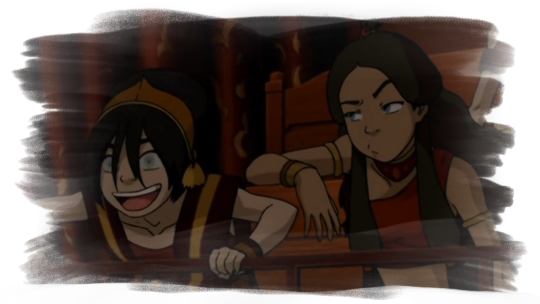
[ID: A shot from the same location as before, this time Toph has a huge smile on her face and is leaning on the balcony excitedly while Katara is leaning towards her, annoyed by her reaction. /End ID]
While it would have been better if Toph was actually listened to, it would have been…fine? if a justification was given for why they had to sit there (e.g. to avoid being recognised), if Katara had actually described the play for her. This wouldn't have been ideal, but it would have been better at least. In real life, many movies, TV shows (including this show's sequel series, The Legend of Korra) and other forms of visual media have an Audio Description track that does exactly that. If they weren't going to move for Toph to be able to see better, having Katara describe the play could have introduced kids to the fact this is an option. but instead it's brushed off, and I'll admit, it left a bit of a bad taste in my mouth, even back in 2006.
The Library is a bit more forgivable in my opinion, since Toph is still new to the group, but in this episode, she states that she doesn't want to go inside the spirit library because she isn't able to read and therefor there wouldn't be anything for her to do. However, it still would have been nice to see her friends consider this at all before they actually arrived. They could have (and should have) still gone, but some acknowledgement that they at least thought about the inclusion of their disabled friend would have been nice.

[ID: A shot of Aang, Katara, Sokka and another man are talking while looking down at a map on the table. Meanwhile, Toph is sitting on the other side of the table, completely disinterested as she sips from a large ice cup with her feet up on another chair. /End ID]
Alternatively, I do feel like Wan Shi Tong, a self-proclaimed all-knowing-spirit or his assistants would have been able to point her in the direction of something to interest her, since he does imply books aren't the only form of knowledge he collects.
The reason I mention this though is two-fold.
In real life, disabled people are very often left out of "fun" group activities, whether that be in formal settings or in casual ones, like hanging out with friends. If the episode had been framed as "the Gaang learns about the library and decides to track it down," I might have been less critical, but it's specifically framed as something that at least starts out as a kind of break for the team where they all take turns picking out fun things to do so they can rest, and Toph's access needs not being considered at all until they're already there hits a bit close to home, especially since they just end up leaving her outside. Secondly, there's also a stereotype that disabled people (and especially blind people) don't belong in academia and places of learning, such as in this case, libraries. This stereotype is about as old as the concept of organised institutions of learning, and definitely isn't unique to AtLA, but the assumption is often that disabled people wouldn't be interested in more formal methods of learning, so it's not worth accommodating us. With blind people in particular, when I've seen this in media, the premise is often "well I can't read anyway so why bother?" which Toph definitely falls into here with no push-back against the trope.
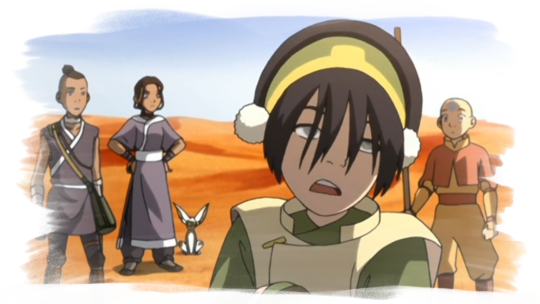
[ID: A close up of Toph and the rest of the group, Katara, Sokka and Aang standing in a desert. Toph shrugs, looking bored, while the others looks confused and surprised with the exception of Katara, who looks mildly annoyed, standing with her hands on her hips. /End ID]
It does make sense that she would have been resistant to going in, and I'm not saying this episode should have turned Toph into a bookwork akin to Wings of Fire's Starflight (another blind character) or anything. But there was a chance in this episode to push back against some of these assumptions, and I think it's a shame they missed it. How cool would it have been if Toph had mentioned not feeling welcomed in more formal learning spaces because of her disability, which was just reinforced by the way her old earthbending instructor and her parents treated her. She decides to go inside the library anyway as "backup" in case something goes wrong, grumbling about it the whole way down. Wan She Tong starts his introduction mostly the same way, saying humans aren't welcome and Toph makes a snarky comment about it. Wan She Tong, equally offended that this human thinks he, the all-knowing-spirit, wouldn't have considered something, shoots back with an annoyed comment about humans being so self-centred. He explains that spirits come in all shapes and sizes, and not all of them have eyes, but they can still access his library. She's not the first sightless being in his study, and he-who-knows-ten-thousand-things knows this too. Once everyone is permitted entry, one of the knowledge seekers shows her to a series of slates about a lost earthbending form that she can actually read (or at least, "see" the pictures on) because it's carved. Or instead of a slate, it's a series of statues outlining the form, similar to what Aang and Zuko find in the episode "The Firebending Masters". Perhaps this form is something that helps her develop metal bending later on, and lays the groundwork for Toph becoming interested in teaching in the comics.
And finally, Toph and Katara's segment of Tales of Ba Sing Se. Katara convinces Toph to go get a makeover with her as part of a girl's day. Overall, this segment of the episode is pretty nice, and I liked that they showed that a person's gender expression (in this case, being a tom-boy) doesn't mean they can't like things outside of what we usually associate with that. Tom-boys can like girly things on occasion, and vice-versa, and I think this is an example of an episode that would seem a bit ham-fisted today, but honestly, was needed in 2006. However, there's a throw away joke where Toph says "as long as they don't touch my feet," and it immediately cuts to show spa workers filing down the calluses on her feet in a way so painful several staff are required to hold her down.
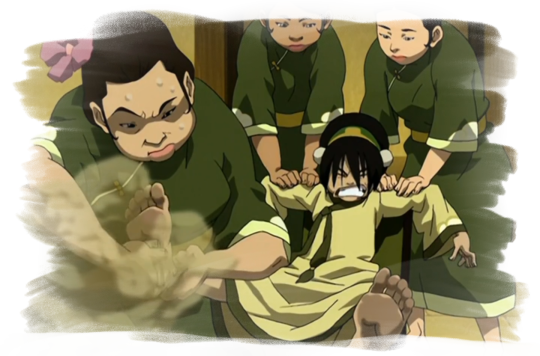
[ID: An image of Toph in a bath robe being held down in a chair by two spa workers while a third scrubs at her feet so hard that she is sweating. Meanwhile Toph is fighting against the two holding her down and has a facial expression like she is in a great deal of pain. /End ID]
this might be a minor thing in the grand scheme of the show, but it's still another example of Toph's boundaries about her disability and her access needs being disrespected by her friends, which the show just doesn't acknowledge it at all. People ignoring Toph's wishes about a part of her body she depends on in a much more direct way that others do is played off like a joke in a montage of otherwise enjoyable and goofy activities and this is a very, very common experience in disability circles.
There are a number of other, much more minor issues that show up with Toph as well, such as the fact she's the only one of the main cast who never has an on-screen (or on-page) relationship. not in the original show, not in any of the comics and not in The Legend of Korra. Again, it's not a big issue on it's own, especially because in AtLA, she's young enough where it's possible that she was just not interested yet, and she does have kids in The Legend of Korra where she mentions a relationship with a man named Kanto (Lin's father). So it is implied she does have some form of relationship eventually, but the issue is that it's never shown on screen or on the page. This feeds into a wider pattern in media of disabled characters being the only ones in their respective cast not given on-screen romantic relationships in stories, and so I still think it's worth pointing out, especially since the creators have had a lot of opportunities to correct that by now.
Toph is also portrayed, pretty much undeniably, as the best earthbener in a way that, at times, comes across almost like the creators felt like they need to compensate for her being on the team "despite" her being blind. This trope is one that I think Toph, at least partially, helped to popularise with the current generation of story tellers: The Disabled Savant. In this trope, disabled characters aren't really given the same room for growth as other characters; they aren't permitted to be average or still learning, they start good and get better. If they do progress, they often become the best, which is the case for Toph. To be fair, everyone in the The Gaang is the best at their respective skill by the end of the first series, which is why I say this is a minor point. She dose, however, have the least amount of on-screen growth in skill out of the whole team. Katara starts out barely able to lift any water at all, let alone actually bend it. Sokka is skilled with weapons from the start but does get his butt handed to him a number of times by others with more experience than him whom he learns from throughout his story arc. Zuko spends most of the early-to-middle of the show having things "blow up in his face" (to use his own words) and being belittled by his family of prodigies. While Aang is an airbending and, to a lesser extent, waterbending prodigy, he fails at pretty much everything else for a while before he starts to find his confidence - especially earth and firebending, not to mention the entire situation with locking himself out of the Avatar state. Toph is the only one who doesn't seem to fail or struggle all that much from a combat perspective. She does grow and improve in her bending (she invents metal bending after all) but she never has any moments where she really messes up or even struggles in combat all that much compared to the others.
All of these points and criticisms I've mentioned are not necessarily big in and of themselves, but when looked at together, they build up to create some issues with how Toph is depicted and how the people around her treat her disability
So that's it then? Toph is bad disability rep and Avatar should be "cancelled"?
God no. Like I said at the start, I still adore Toph and Avatar as a whole, but the show is a year away from being two decades old, it's bound to have some elements that don't hold up and I think it's worthwhile discussing them, specifically because I love the show and it's characters. Despite all the negativity I've brought up, I do think there are a lot of things AtLA did well with Toph too.
I've mentioned a few times that we rarely see how Toph's blindness impacts her life outside of her bending and combat abilities, and there's a reason I made that specification. Unsurprisingly, if you know much about the show's development, the ways in which Toph’s blindness and seismic sense impacts her bending and fighting style is one area where the show really does shine, and I still think that is worth a mention. The various types of bending are based on different styles of martial arts, specifically, different types of Kung Fu. Most earthbending in the show takes heavy inspiration specifically from Hung Ga, but Toph is different. Her bending heavily references Southern Praying Mantis Kung Fu, something unique to her within this world.
The reason for this (outside of simply wanting her to be visually distinct) was because the show’s creators made sure to consider what limitations Toph might have and what parts of the more common earthbending styles wouldn't work for her. Since her connection to the earth was critical in order for her seismic sense to work, they decided on a style that would keep her feet on the ground more, prioritised strong stances with minimal jumping and put more focus on attacking with her upper body. While not an intentional choice, the style they went with for Toph, according to the show's head martial arts consultant, Sifu Kisu, was supposedly developed by a blind woman in real life, at least according to legend. The creators also made further adjustments to the style with the help of martial arts consultants and just watching Toph fight is evident that a lot of love and care was put into the decisions made on that front.
I also appreciate that Toph's disability wasn't off-limits to joke about.
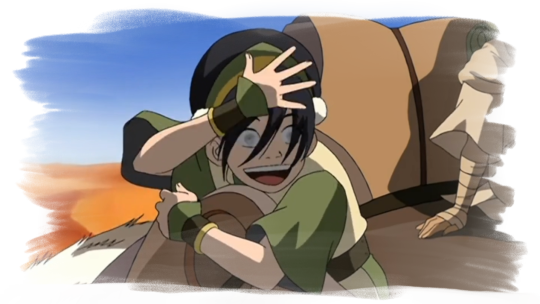
[ID: A picture of Toph waving her hand in front of her face with an exaggerated smile to remind the others she's blind. /End ID]
As I already mentioned, they didn't land 100% of the time, but lot of shows are afraid to use disability as a source of jokes, which would have felt weird and out of place in a show like Avatar. I see this hesitance in real-life too; people get extremely uncomfortable when I joke about my own disabilities and I've heard several people and even disabled comedians talk about the same observation. My last video on Tik Tok that got outside my usual audience was a joke about my prosthetic leg, and every single stictch and duet I received was people saying some variation of "I'm such a bad person for laughing!" "I'm going to hell!" or just straight up asking if they're aloud to laugh. If I didn't want you to laugh, I wouldn't have posted the joke! But joking about disability does make it more approachable.
Despite how often Toph and the others made blind jokes though, outside of the one instance I mentioned earlier, they never felt mean-spirited or like they were punching down. Even when a very sleep-deprived Katara was intentionally trying to be.
I think it's also worth keeping in mind the context of the media landscape when Avatar The Last Airbender was airing. Today, characters like Toph are very common, so much so there's a whole trope about them (super-crips) but at the time, having a character with a major disability be a main character in an action-orientated kids show like Avatar was really rare. She wasn't the first of course, but a lot of the time, if they were included, they were almost certainly sad and depressed, wishing for a cure or they were designated to the roles of "Guy in the chair" (which is a character, usually a tech person, who helps from the background), inspiration, scary villain fake-out (or other variations of "creepy" character) or the actual villain. Having a character that was not only comfortable in her skin as a disabled person, who didn't want or need to be "fixed" or "cured" to be directly involved in the story, and who's main obstacle (at least in season 2) were how the people around her treated her, was pretty ground-breaking at the time (pun not intended) and went against the most prevalent stereotypes of it's day.
And I really want to emphasise that. For many Millennials and older Gen Zers, myself included, Toph was the first character that didn't tell us we were broken and needed to be fixed in order to be part of the group (even if they slipped up with that messaging occasionally). Prior to seeing Avatar, I honestly thought there was something deeply wrong with me for being happy with my life (a reminder, I was 10 years old when this show first started airing), because every other disabled person in the media only ever talked about how much worse their life was because of their disability, how much they hated it and how much they hated themselves. Many outright said that they wished they had died rather than become like me. Toph wasn't the first to go against those tropes, but she was the first example of a disabled character who wasn't like that many people my age saw. Did she do it perfectly? Hell no, but personally, back then, I was happy to have a character who maybe over-corrected and took things a bit too far than another sad character talking about how lives like mine weren't worth living.
I also deeply appreciated that Toph did struggle with her independence, at least initially, and where to draw the line with accepting help. Because of how much she'd been coddled and overprotected as a little kid, she saw any attempt at people being helpful and working as a team as them trying to baby her. It was very on the nose, but I liked that the show gave her an episode just dedicated to realising that it's ok to accept help. Again, this is a bit of a story telling trope today, but having the disabled character realise that it's ok to accept help, and to do it without talking down to them or saying that them wanting independence was bad, was a refreshing change compared to what was around at the time.
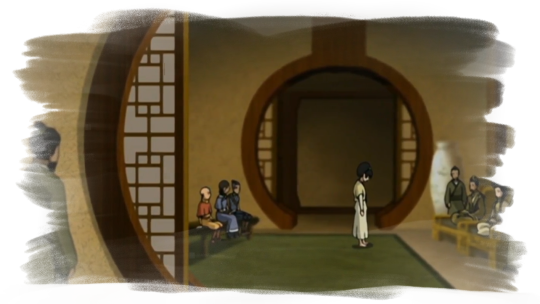
[ID: a zoomed out image of Toph, standing before her parents with Aang, Katara and Sokka standing behind her. /End ID]
While I think the show's creators could have benefited from consulting with disabled people and specifically blind people the same way they brought in consultants for the martial arts featured in the show, it's very clear to me that the intention behind Toph's character was good, and that actual effort was put in to make sure they depicted her well, even if some of it was a bit misplaced. It's also worth noting that the groundwork for a lot of my suggestions is already in place, they just didn't follow it all the way through.
Overall, I'd say Toph was good for her time, and she's what was needed in the 2000's, even if she doesn't hold up as well today. I also think it speaks to how far we've come in terms of disability representation. When I first started engaging with the online fandom directly, almost no one, even other disabled people, argued that Toph wasn't good representation, because honestly, the bar was on the floor and we were just happy to have something different. But now there are options, and the standards are higher, and that's so, so good. It means that people, even in the media, are starting to listen and be more thoughtful about their depictions of disability than we were in 2006.
And finally, I want to really quickly mention The Netflix adaptation of Avatar. A few people have asked me now what I think they should do with Toph when they get to her, and what my predictions about the show are. I'm not going to talk about my predictions here, because this post is already way too long and that's not what this is about, but I don't think the suggestions I made today would necessarily work in this particular remake, primarily because of the tonal differences. Some adjustments definitely could, such the other characters doing a better job at listening to Toph when she points out inaccessibility and them actually considering her in the first place, but others might be harder to balance. The original show could get quite dark and serious at times, but it was primarily a light-hearted adventure story for kids. From what I've seen of the live action remake though, they're more heavily leaning into those serious elements - for better or for worse, and as such, trying to tone Toph down in the specific ways I mentioned might not balance out as well as it would in the original show. At the very least, the specifics would need to be different. To be honest, I'm not entirely sure what approach they should take, that's not really the point of this post, but I did want to quickly address it to avoid confusion. My suggestions today were specifically on how to approach the cartoon version of Toph for a modern audience, and were not meant to be read as suggestions on how her live-action counterpart should be depicted.
#writing disability with cy cyborg#Wow I had a lot more to say about this than I thought (I think this is my longest post to date lol)#writing disability#disability representation#writeblr#writing#Avatar#avatar the last airbender#atla#Long Post#toph#toph beifong#the gaang#Animated Avatar#disability in media#fantasy
220 notes
·
View notes
Text
seems to me like zac oyama is repping some experiences of asian american schoolkids, defined by such hits like 'regulate your anger,' 'communicate clearer to deliberately misunderstanding assholes,' and 'perpetual sense of unbelonging in both the american part and the asian part of your life.'
#dimension 20#fantasy high#fhjy#zac oyama#gorgug thistlespring#great stuff! I can't watch that shit for entertainment#the asian american strugglebus... feeling like an alien hahahahahahahahahahahahahaahha#this is just surface level personal experience ofc like maybe I had a very specific version of childhood#oh yeah did i mention the Designated Role you get in school lol that's fun for literally nobody who ever attended school schools suck#but education is good! try not to drop out or at least get geds they help college is a good thing check out crash course on youtube#panic rambling in the tags tonite#my thoughts#talking about my asian-ness makes me so nervous my westernized brain is yelling 'shut up! shut up!'#I enjoy gorgug being rage-ful as a treat#asian things
262 notes
·
View notes
Text
~~Delightfully inspired by being at home~~
Bakugou Katsuki is an only child.
No siblings - because one gremlin spawn is enough to take care of.
All of Katsuki’s cousins are older than him.
Katsuki IS the baby of the family. . .
Which is why when he meet you, and then proceeded to meet your family, he was in a total culture shock.
You’re one of the oldest kids in your family.
When the two of you arrived to your families summertime reunion he was absolutely flabbergasted.
Once you stepped into the house you were gone in a flash!
I mean he expected as much since you lived so far away now and had such a good working relationship with your family. But he didn’t expect for you to DISAPPEAR ON HIM.
To be swallowed by a hoarde of similiar-faced relatives all shouting about how you’ve been!!
the L/N genes were strong apparently . . . you really all do look alike, huh.
Bakugou had barely stepped into the house, your luggage’s still in hand, before becoming an obstacle for children. One of your little cousins actually barrelling into his muscular thigh with a little “oof” and “sorry mister! hey! wait for me!”
Before bounding out the wide open front door to chase their playmates back around to the backyard, and then through the entire house again . . . as children are often prone to do.
Now, Bakugou tried to find you amoungst the little gaggle of children and sometimes teenagers that blew around his ankles, as they giggled and shouted and whooped as they weaved their way around him.
at least let him find you, or one of your parents or siblings, so they can tell him which room you’d be staying in.
he’d meet them on several occasions before and secretly reveled in watching watching you and your siblings engage throughout the few visits and events he’s been invited on.
All these other people and rambunctious kids he wasn’t all too sure about . . .
——————
now Y/N was having the time of her life relaxing and catching up with her family
Her boyfriend, Katsuki, was not finding this relaxing.
Bakugou Katsuki felt totally out of his element: a fish out of water. Or rather, an explosive man in water.
————
his ruby eyes would snap open most mornings, at some inhumane hour from some early bird kids stomping around and giggling in hushed tones (not so hushed in his opinion) as they moved down the hallway and past your door.
And Bakugou would squint his eyes into the blackness; the void. And stare at where the door was supposed to be until they passed and burrowed his face back against your perfectly sloped shoulder and slept until some kid was send by the older folks to slam open the door and wake you up.
Bakugou absolutely couldn’t fathom this part of the routine. He absolutely hated it.
You however only ever seemed a touch miffled. And always informed the tiny correspondent with a playful pat on the head that you and him were now awake and would join the rest of them downstairs.
. . . but eventually the little cousins would soon come running around the side of the bed to make sure he was awake too. . . and Bakugou couldn’t help but turn, pick the kid up, and playfully wrestle the flailing and giggling kid on the bed into submission, and they revealed the menu for breakfast.
And they would giggle and dart out of the room so fast saying, “Y/N’s awake! And her boyfriends Bakugou’s awake! He wants extra eggs!”
And it definitely wasn’t his idea of relaxing playing UNO with about 10 players every other evening. And constantly hearing you and the older kids and adults all explaining what color card the youngest one needs to put down.
Or GO-FISH for that matter!
Since apparently that silly game of chance seems to be the only one every age group can play without explaining the rules. What’s the point of a game of guessing who’s got what card? Especially when he never even gets close to winning. (Yes, he was terrible at it.)
Your family even plays for second to last place, and lo and behold he’s somehow duking it out with a 9 yr old now.
And Katsuki Bakugou definitely doesn’t enjoy participating in the family water balloon fights, or watching and dodging the stray streams from squirt guns fights as he stands at the grill with all the other men, or chasing down the muddy dog in the house, or the epic made-believe quests.
And you definitely believe him when you pass him walking through the house on morning after finishing the dishes in company with a fairy princess, pirate, and a mermaid “but-she’s-got-legs-right-now-cause-she’s-on-land.” as he walks about wearing an eye-patch on his face and a tutu around his arm
And he’s no longer “not in his element” by the end of the trip when he takes his turn to make breakfast for the whole family.
Going upstairs himself to wake up the little ones and the grumbling teens. Making sure to let you sleep in and it’s a pleasant surprise when you make your way downstairs a little later to see him manning the kitchen.
everybody sat down or standing around as they chow down. And you get greeted with a swift kiss to your temple and grumbled “g’morning.”
your mom chirping up, “Katsuki’s made your favorite sweetpea!”
———
And you’re pleasantly surprised once again as Bakugou joins you in on the last day of your visit.
Finally stepping foot into the mattress/sleeping bag kingdom that’s set up in your house.
He comes in to find you sitting at the front of the room waving your hands across the air as you engage in the last saga of this thrilling interactive bedtime story you’ve been narrating the whole trip. And Bakugou walks in and tosses all the fallen blankets back over peoples beds.
Shuffling himself underneath a blanket he’s just rescued and making himself comfortable as he squeezes in next to the teens.
And it’s at some part in your story that he furrows his brow and opens his mouth muttering something to the two adolescents squished beside him.
His arms crossed across his chest as a dinosaur stuffed animal rests, precariously balanced, on his broad shoulders because, “you need a stuffie for Y/Ns storytime”
and the three of them wave their hands and signal for you to pause and Bakugou grumbles out “- hold on babe, who is this dragon prince character anyway?”
And all the kids erupt in laughter shouting, “YOU, YOU SILLY BOYFRIEND.”
and his mouth is agape.
And you simply shrug, “well duh ‘tsuki. who else? Now where we’re we?
Right so then the Dragon Prince, the Swordsman, and the Dashing Runaway Prince of the Kingdom decided that they . . .”
#bakugou headcanons#bakugou katsuki#katsuki bakugou#bakugou x reader#bakugou fluff#bakugou drabble#katsuki bakugo imagine#this actually turned out way better than I thought#I’m shocked lol like it just fits him so well#anyone else relate?#He’s definitely won the approval of everyone I’d say 😂#The Fantasy AU is actually just Y/Ns marvelous make-believe stories in my head!!#Oh! PS - yes the tutu is stuck around his forearm bc his bicep is too beefy!
2K notes
·
View notes
Text
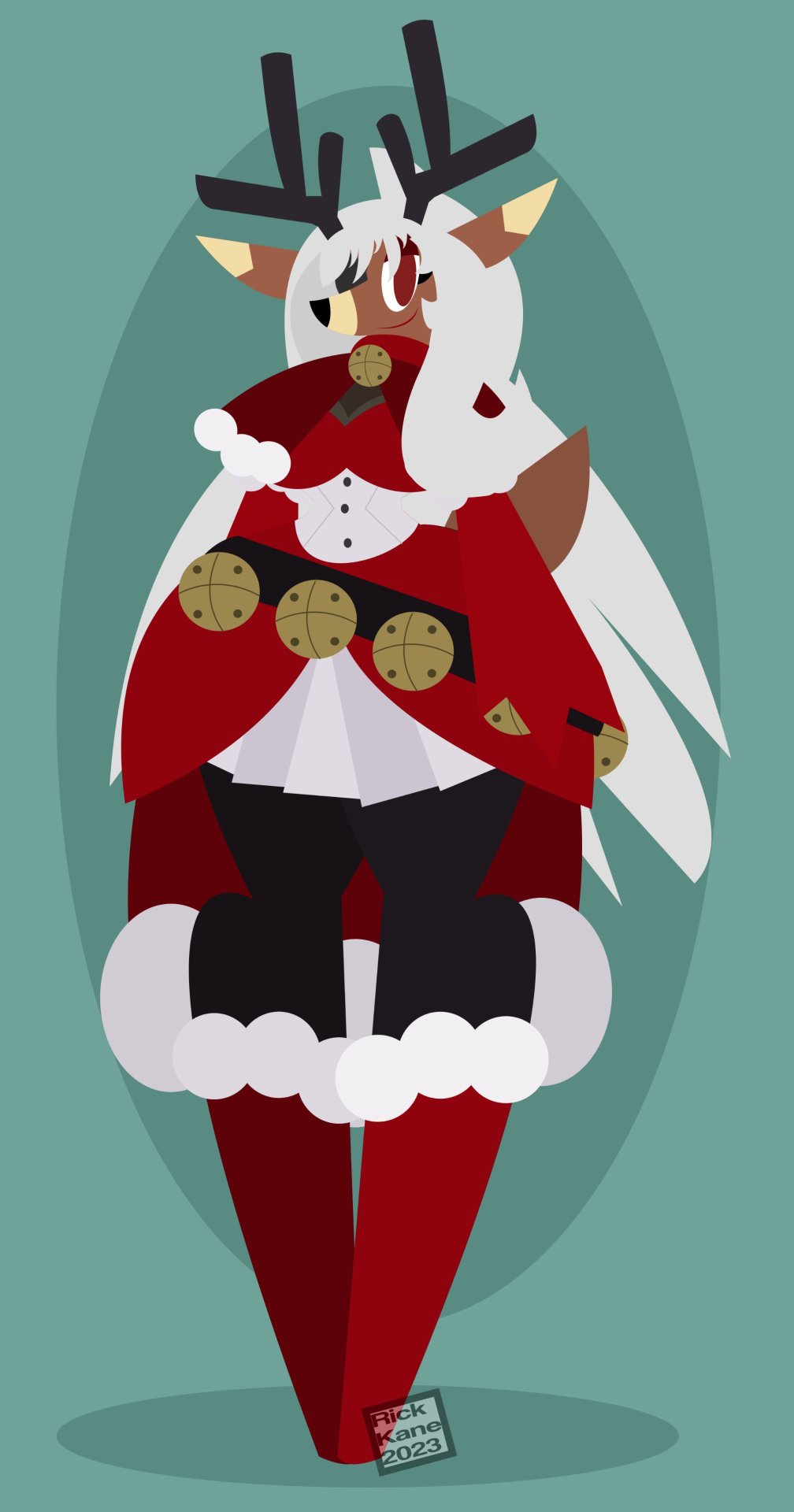
Rina Reindeer
#cartoon#anthro#furry#anthro art#fantasy#oc#deer#reindeer#deerposting#furry stuff#furries#deercember#genshin impact looking deerb lol that was on the notes I wrote thought I share that XD
188 notes
·
View notes
Text
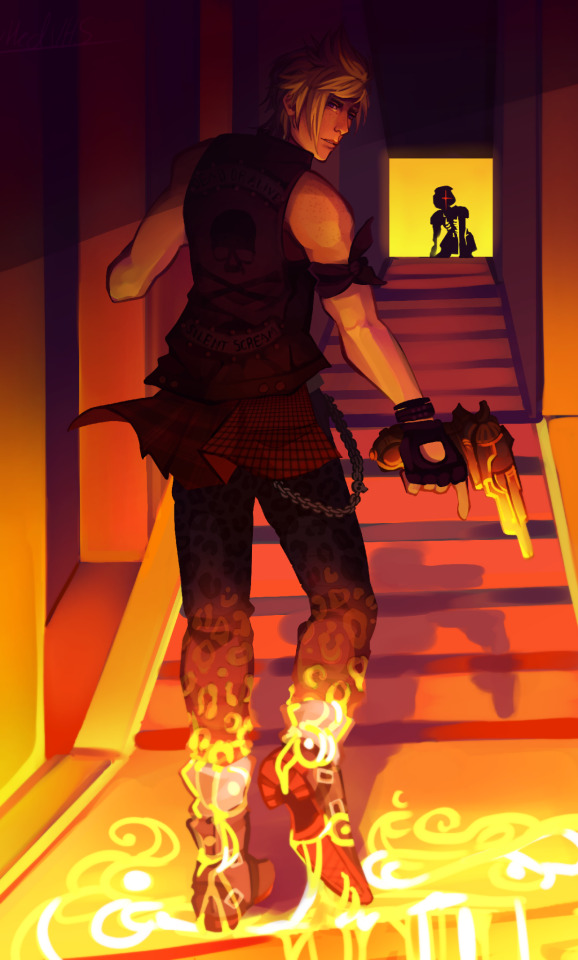
An experiment loosely based off @/fleeting_ember's lava leopard art
Honestly just wanted to try out some more funky lighting and backgrounds :P
#final fantasy#final fantasy xv#ffxv#prompto argentum#prompto#episode prompto#I'm sure you could figure out some kind of symbolism for the glowy swirls but I'm not smart enough for that lol#I just thought they looked pretty#also cropped version cause I like it more#my art#lemplort art
534 notes
·
View notes
Text

i let my thoughts wander / [he] is quiet and just breathes / for a little while
#i started this with the coloured pencil brushies on a whim but i haven't found a good way to colour big expanses of skin with it#so i spent like 3 hours just trying to course correct lol#maybe i should rescale the texture... or work smaller... food for thought#anyway.#Ardbert#warrior of light#fanart#speedpaint#i draw sometimes#Final Fantasy XIV
86 notes
·
View notes
Text
To me, Alisaie is that one girl that would go and catch every frog and lizard in the immediate area when left unsupervised for even five minutes.
#ffxiv#ff14#final fantasy xiv#rambling#alisaie leveilleur#headcanon based on how i was as a child#just a silly thought lol#maybe thats why she likes Shiun so much
183 notes
·
View notes
Text
It's like at what point does the hate of fighting your enemy turn into love. You spend years fighting each other to the point where the other has memorized the way they move and fight. The same scathing words and venom filled exchanges that never resolve become teasing and playing with the other. Managing to hurt the other becomes a game of affection, seeing who can best the other. After many years realizing you are each other's purpose. Idk man!
#sefikura#idk what to call this#thoughts?#i be thinking#sephiroth#cloud strife#lol#hannibal#um#not just applied to ff7 ngl#ff7#final fantasy vii#any suspiciously intense rivalry can work#like#league of legends
69 notes
·
View notes
Text
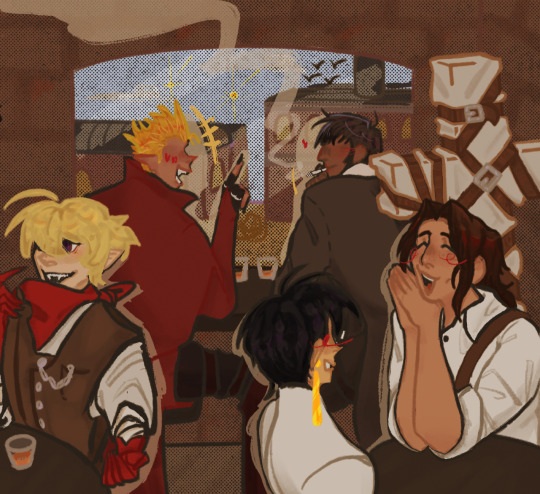
aint bad with good company and a good drink
#trigun#vashwood#millymeryl#vash the stampede#vash saverem#meryl stryfe#milly thompson#nicholas d. wolfwood#nicholas d wolfwood#zazie the beast#trigun 98#trigun fanart#scrib: linkings#worked on this for a trigun secret santa for a server... its a 98 specific fantasy western au a bit?#changed up the outfits slightly to reflect some victorian esque vibes [yes i know its not historically accurate it pains me but i was not#going to do costume design for a month and a half. nor did i have time to LOL]#but yeah! a bit of a vampire + vampire hunter au.... i did have a set of doodles i had in universe that accomponyed it but... idk if i have#the confidence to post fully gay shit yet lmfao#vash is a vampire. zazie is a vampire. insurance girls are vampire hunters assigned by the government and ww is a vigilante hunter... also#sent to collect specimen.... meryl could not believe vash was a vampire at first bc she thought vamps were supposed to act a certain way...
86 notes
·
View notes
Text
I just checked the final bids on the fantasy high mini auction and someone PAID $12555.55 FOR FIG?!?!!!??!?
THAT'S LIKE AT LEAST 3X MORE MONEY THAN ANY OTHER MINI OF THE BAD KIDS
ADAINE HAD TWO AND THEIR COMBINED TOTAL IS HALF OF WHAT FIGS WENT FOR!!!
oh to have enough disposable income to drop upwards of ten thousand dollars on a tiny figure of one of my little guys
#I'm so happy for dropout tho it was an incredible outcome for an awesome cause#also one of the corn cuties went for $1 more than riz and I think that's funny#arthur aguefort was like $10000 too and that surprised me#kalvaxus went for way lower than I thought it would too#I like watching the auction for funsies even though I can't participate bc not american and also not rich lol#dimension 20#fantasy high#dropout
104 notes
·
View notes
Photo

#forest#nature#gothic#gothic architecture#cathedral#fantasy#elven#fairy#collage#photomanipulation#weirdcore#dreamcore#my edit#mine#yeah don't really have an explanation for this one other than that i was drunk in the woods#and saw those two trees leaning together and thought they looked like a gothic arch. Lol#surreal#spooky#green#aesthetic
269 notes
·
View notes